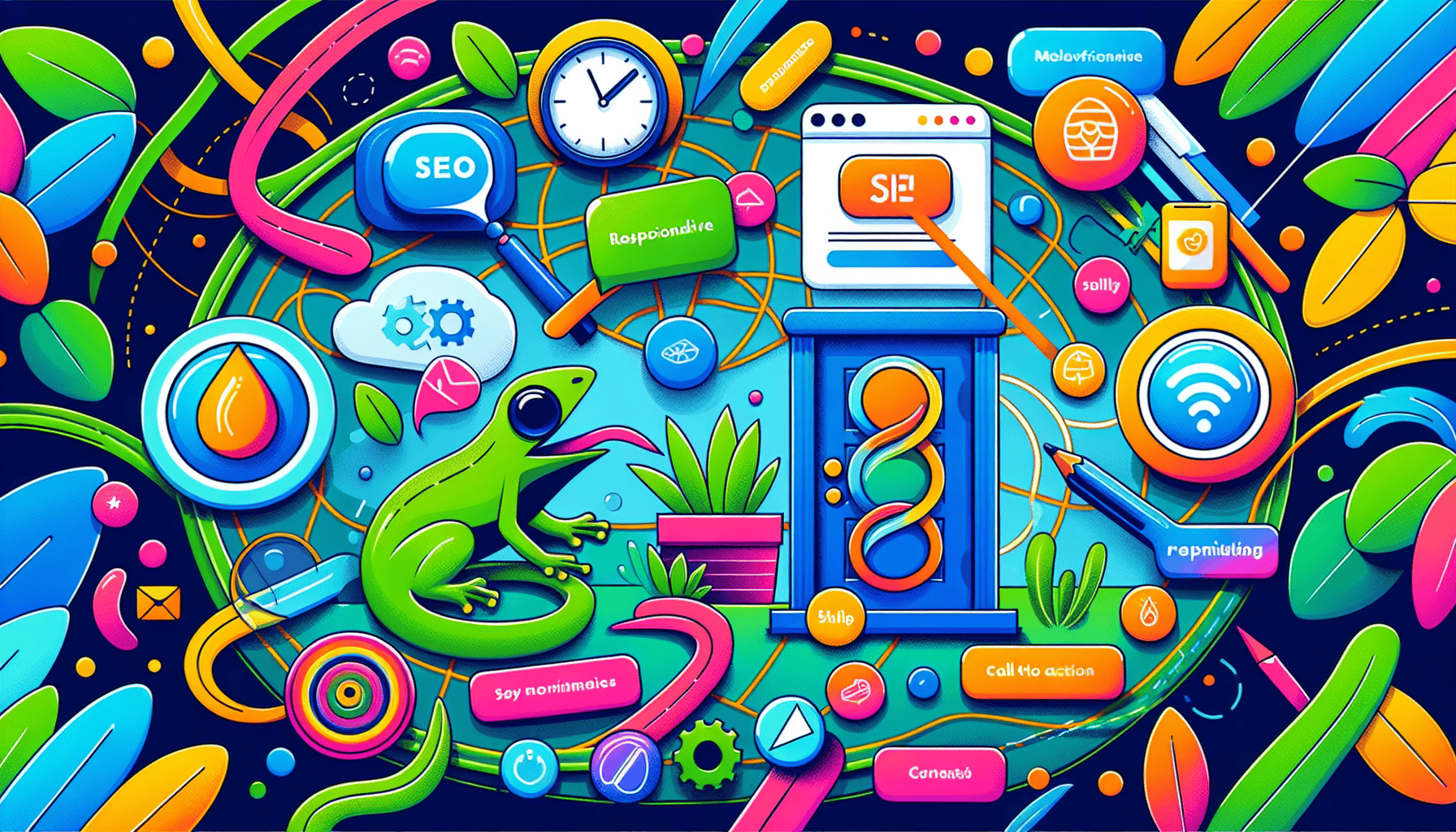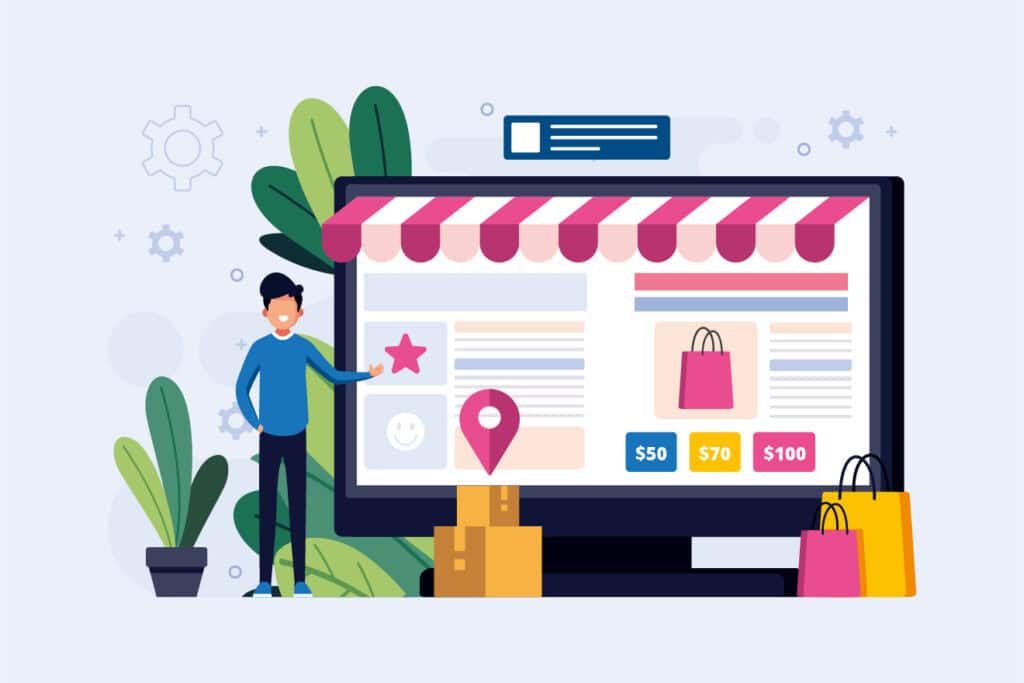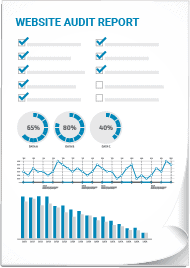Effective small business website design can elevate your brand, attract new customers, and drive sales. In this article, we cover why your business needs a professional website and how to choose between DIY and hiring a professional. You’ll also learn about essential website features and cost considerations.
Key Takeaways
A professional website is crucial for small businesses to establish credibility, extend their reach, and serve as a 24/7 digital brochure for their products and services.
Choosing between DIY and professional web design services depends on budget, technical skills, and business goals, with professional designs offering more customization and support.
Key elements of an effective small business website include mobile optimization, ease of use, SEO-friendly design, and clear calls to action to enhance user experience and engagement.
Why Small Businesses Need a Professional Website
In today’s digital landscape, a professional website plays a pivotal role in the success of a small business. Given that first impressions carry significant weight, a professionally designed website is key to making a positive impact. When potential customers land on your site, they immediately form opinions about your business based on its appearance and functionality. A well-crafted website radiates professionalism and sets the stage for building trust and credibility.
Furthermore, a well-designed website can be instrumental in asserting the legitimacy of your business. Unlike social media profiles or user-generated content on platforms like Yelp or Google Maps, your website is entirely under your control. You can craft your brand’s message, showcase your products and services, and highlight customer testimonials to build a trustworthy image. This level of control can significantly boost your credibility and help you attract and retain customers.
Not just limited to establishing credibility, a professional website also aids in:
Extending your reach beyond the local community
Serving as a digital brochure, providing potential clients with insights into your business and offerings, making it easier for them to determine if you’re the right fit for their needs
Tapping into new markets and even attracting international customers, all while promoting your products and services around the clock
In essence, a professionally designed website is not just a digital asset; it’s a vital component of your business strategy.
Choosing Between DIY and Professional Web Design Services
There are two main options for creating a small business website: designing it yourself or hiring professional web design services. While DIY web design can be a more cost-effective solution, it often requires a significant time investment and a steep learning curve. Platforms like Leadpages might offer affordable plans starting at $37 per month, but the time and effort required to build a functional site can detract from other business priorities.
Contrarily, professional web designers, with their expertise and experience, offer more unique and personalized website designs. They understand the intricacies of creating a site that not only looks professional but also functions seamlessly. Unlike DIY websites, which might suffer from limited functionality and generic templates, a professionally designed website can offer enhanced features and better customer support. This can make a significant difference in your online presence and the impression you leave on your visitors.
Your budget, technical skills, and business goals will ultimately dictate your choice between DIY and professional web design. If you have the resources, investing in professional web design services can lead to a more polished and effective website, helping you stand out in a competitive market. However, if budget constraints are a major concern, starting with a DIY approach and gradually upgrading to professional services as your business grows can be a viable strategy.
Key Features of an Effective Small Business Website

An effective small business website should be visually appealing, functional, and user-friendly. One of the most crucial features is mobile optimization. With a growing number of users accessing websites from their smartphones and tablets, ensuring your site looks great and functions well on any device is non-negotiable. A mobile-optimized website not only improves user experience but also boosts your search engine rankings.
Ease of use is another important characteristic. Your website should have:
Logical navigation
Consistent layouts
Clear and intuitive menu
Well-organized content
Search function (if applicable)
User-friendly websites keep visitors engaged and reduce the chances of them leaving in frustration.
A design that is SEO-friendly is also vital. Your website should be optimized for search engines to ensure it ranks well for relevant keywords and attracts organic traffic. This involves:
Having a responsive design
Good site structure
Unique content
Ease of navigation
A well-optimized site not only improves your visibility but also enhances the overall user experience.
Finally, to guide visitors towards the intended purpose of your website, clear calls to action (CTAs) are necessary. Whether you want them to make a purchase, sign up for a newsletter, or contact you for more information, your CTAs should be prominent and compelling. Quality content and easily accessible contact information are also vital. Fresh, engaging content keeps visitors coming back, while multiple points of contact ensure they can reach you easily.
Custom vs. Template-Based Websites
In the realm of small business web design, small business owners frequently grapple with the decision between custom websites and template-based ones, often seeking guidance from web design agencies.
Custom web design involves:
Building a website from scratch
Allowing for a highly tailored brand experience
Offering unique design and functionality, ensuring your site stands out and effectively engages visitors
Optimizing for faster loading times
Handling increased traffic as your business grows
On the flip side, custom web design often entails a higher cost and extended development time. For businesses with limited budgets or those needing a quick online presence, template-based websites can be a cost-effective solution. Templates provide user-friendly interfaces, allowing you to:
Customize and manage your site without needing technical skills
Choose from a variety of pre-designed layouts and styles
Easily update and add content to your site
While templates may result in a more generic look and offer limited flexibility, they ensure your website meets standard usability expectations.
Your business needs and resources will ultimately determine your choice between custom and template-based websites. If you require a unique, highly functional site and have the budget for it, a custom website is the way to go. However, if you need a quick, budget-friendly solution, a template-based website can still provide a solid foundation for your online presence.
How to Find the Right Web Design Company

Selecting the appropriate web design company is key to the success of your small business website. Start by scrutinizing the portfolio of potential web design companies to understand their capabilities and design aesthetics. Look for examples of sites they’ve built in your industry, paying attention to ease of navigation, aesthetics, and clarity of business information. This will give you a sense of their experience and whether they can meet your specific needs.
Following that, here are some steps to evaluate a company’s performance and reliability:
Peruse client testimonials and reviews to get insights into their reputation and customer satisfaction.
Request client references and check third-party review sites for additional feedback.
Consider the company’s industry experience and the skills of their team members.
Look for a company with a proven track record and knowledge of the latest design trends and technologies.
By following these steps, you can find a company that is more likely to deliver a successful project.
Ascertain the extent of ongoing support and maintenance services the company provides. A good web design company should provide regular updates, security patches, and customer support services to ensure your website remains functional and secure. Additionally, having a dedicated project manager can make the design process smoother and more efficient.
Lastly, take into account the company’s approach towards prioritizing clients. A web design company that prioritizes customer satisfaction and has a client-first mentality is likely to be a valuable partner in your business’s growth. Using resources like DesignRush’s Marketplace can help you connect with suitable agencies for free, making the process of finding the right web design company easier and less expensive.
Understanding the Cost of Small Business Website Design
Several factors like design complexity, functionality, and project timeline can cause the cost of small business website design to fluctuate considerably. On average, hiring a web design agency for a basic business website can cost between $2,000 to $5,000. More complex sites with advanced functionalities like e-commerce or third-party system integrations can cost up to $10,000 or more. The average hourly rate for web design services ranges from $30 to $80. This variety allows clients to find a rate that fits their budget and needs.
Design complexity, such as custom graphics and animations, can significantly increase costs. Each additional webpage requires more design and development time, contributing to higher overall expenses. Rush projects often incur higher fees due to the need for additional resource allocation and priority scheduling. It’s important to set a budget that prioritizes value over affordability and seek transparency in pricing from your chosen web design company.
Small business owners should factor in the following costs when planning for their website:
Initial design and development costs
Regular software, plugin, and security updates (typically $50 to $200 per month)
Backup solutions (ranging from $5 to $50 per month)
By understanding and budgeting for these costs, you can ensure that your website remains functional, secure, and up-to-date.
Leveraging SEO in Your Small Business Website Design

Incorporating SEO into your small business website design is vital for boosting online visibility, lead generation, and sales increment. SEO is a cost-effective strategy that helps you:
Reach your target audience
Generate long-term results with minimal maintenance compared to paid marketing
Attract more organic traffic
Ensure your site ranks well for relevant keywords
A well-optimized website can convert high-quality traffic into customers by facilitating desired actions like sign-ups or purchases. Integrating SEO during the design phase ensures that search engines can access and index your website’s content effectively, improving your site’s visibility and user experience. Custom websites built with SEO best practices can significantly enhance your online presence and help you stand out in search engine results.
DIY websites, on the other hand, may have limited SEO capabilities, affecting their visibility and performance. Therefore, investing in professional web design services that incorporate SEO from the start can provide a significant advantage in the competitive online marketplace.
The Role of Content Management Systems (CMS)
By simplifying content creation and updates without necessitating coding skills, a well-selected content management system (CMS) can substantially improve your small business website. Most CMS platforms are web-based, allowing small business owners to update their content from anywhere with internet access. This flexibility is crucial for keeping your website current and engaging.
Popular CMS platforms like WordPress offer extensive plugins and themes, making them highly customizable and scalable for small businesses. With over 60% of the global market share as of 2023, WordPress is the most popular CMS due to its user-friendly interface and extensive support options. A good CMS also includes security features to protect your website from bots, hackers, and vulnerabilities, ensuring your site remains secure.
By choosing the right CMS, you can manage your content efficiently, customize your site to reflect your brand’s identity, and scale your website as your business grows. This ensures that your website remains a valuable asset in your digital marketing strategy and helps you achieve your business goals.
Enhancing User Experience (UX)

Improving user experience (UX) via professional UI/UX design is key to promoting customer loyalty, ramping up conversion rates, and building brand credibility. A user-friendly design ensures a seamless and enjoyable customer journey, leading to higher conversion rates and customer retention. Positive user experiences are crucial for business growth and can differentiate your business from competitors.
Good UI/UX design simplifies the user journey, reducing friction points and making it easier for customers to complete desired actions like purchases or sign-ups. This can significantly improve your conversion rates and increase customer satisfaction. Investing in UI/UX design early on can also save money by avoiding costly post-launch revisions.
A professional, user-friendly UI/UX design helps establish brand credibility and trustworthiness, setting your business apart from competitors. By ensuring that your website is responsive, easy to navigate, and quick to load, you can create a positive and lasting impression on your visitors.
Case Studies: Successful Small Business Websites
Case studies of thriving small business websites exemplify how professional web design services aid startups and small firms in achieving their objectives and expanding their online presence. For example, Igniting Business specializes in providing services to startups and small companies. One notable example of their work includes helping Koehn Building Systems, a general contractor, create a professional website that enhanced their online presence and credibility.
Successful Direct-to-Consumer (DTC) brands employ effective marketing strategies, such as those highlighted by OptiMonk, which includes easy-to-copy personalization tactics. These case studies demonstrate how professional web design services can help small businesses create a robust online presence, attract more customers, and achieve their business goals.
By learning from these successful web design projects, small business owners can gain insights into the best practices for web design and apply them to their own websites. Whether you’re a local business or a startup, investing in professional web design services can help you create a website that is:
Beautiful
Functional
Effective
Drives online success.
Summary
In conclusion, a professional website is essential for small businesses to create a strong first impression, establish trust and credibility, and increase their online presence. By understanding the key features of an effective website, the benefits of professional web design services, and the importance of integrating SEO, small business owners can make informed decisions that drive business success.
As you embark on your web design journey, remember that your website is a powerful tool for reaching new customers, promoting your products and services, and growing your business. Invest in a professional website that reflects your brand’s identity and meets your business needs, and you’ll be well on your way to achieving your business goals.
Frequently Asked Questions
How much does it cost to design a small business website?
Designing a small business website can cost between $2,000 to $5,000 for basic sites, and up to $10,000 or more for more complex ones. Hourly rates for web design services range from $30 to $80.
Should I choose a custom website or a template-based website?
It ultimately depends on your business needs and resources. Custom websites offer unique design and better performance, but come with a higher price and longer development time. Template-based websites are more budget-friendly and quicker to deploy, but may lack flexibility.
What are the key features of an effective small business website?
The key features of an effective small business website include mobile optimization, user-friendly design, SEO-friendliness, visual appeal, fast loading, clear calls to action, quality content, and accessible contact information. These features are crucial for a seamless user experience and improved search engine rankings.
How important is SEO in web design?
SEO is crucial in web design as it enhances online visibility, generates leads, and increases sales by optimizing your website for search engines. Integrating SEO during the design phase ensures search engines can access and index your website’s content effectively.
How can I find the right web design company for my small business?
To find the right web design company for your small business, scrutinize their portfolio, read client testimonials, evaluate their industry experience and skills, inquire about ongoing support, and consider their client-first approach. Using resources like DesignRush’s Marketplace can help you connect with suitable agencies for free, making the process easier and less expensive.




